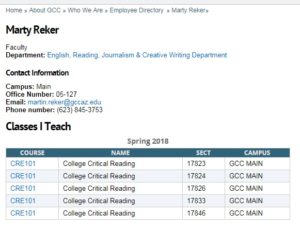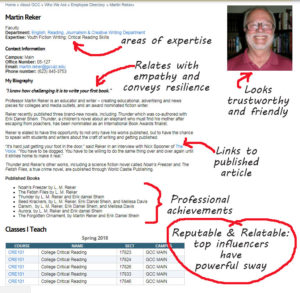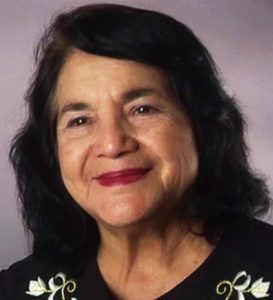Tag Archives: Relationships
Don’t Make Small Talk – Make Big Talk
Want to build generational wealth? Do this first!
WEEK 6: The “One Thing” and The Final Step
Welcome back to the final week of the” One Thing” you can do to raise enrollment, a six week “how-to” series.
The NUMBER ONE REASON employees cite for NOT completing their employee bio page:
Now you know!
Your employee Bio Page is the ONE THING you can do to influence the student decision-making process, raise enrollment, and raise GCC’s reputation in an increasingly crowded marketplace.
If you’ve been following along, you know by now that completing your employee bio page is a seemingly SMALL thing that pacts a powerful, influential punch.
But if you are just joining us, follow these links to catch up on this data-driven strategy:
Week 1: What’s on your GCC bio page right now?
Week 2: Quotes – their power to connect.
Week 3: How to get a rep.
Week 4: Your face.
Week 5: The “One Thing” Before and After
Here we go – Week 6 – the final step: today you find out how to copy and paste your story into a simple Employee Biography online form, and click “submit”.
Here’s what you’ll need:
- First name
- Last name
- GCC email address
- Credentials (such as MS, Ph.D.)
- Biography (Hint: Review Weeks 2, 3 and 5, and be relatable, not stiff)
- Areas of Expertise (Special knowledge or field of study)
- Office Hours
- Headshot (This is a photo of your face. It should be cropped to a perfect square. You will click to upload a jpg, which will be resized to 280×280 pixels. See Week 4 for photo tips)
- Personal Website URL (This is a separate step: To include a link to your work-related Website, login to your Maricopa profile using the Manage My Account tool, and add the url there. It may take up to a week for the link to appear on your Employee Bio page, depending on how often the Web Team refreshes the Website.)
Ready? Use this form to update your bio page. (The link to this form is listed here on the GCC website.)
That’s it! 
For those itching to know the broader impacts, read these final bits:
Dear Faculty, you, perhaps more than anyone else, are uniquely empowered to factually communicate GCC’s reputation by explicitly stating your credentials and experience, why you continue to choose to teach at GCC, your areas of passion, and your teaching methods. You have been empowered to give the community concrete reasons to choose you, and GCC, over every other institution. The broader impacts of doing this one thing includes reputation, enrollment, media attention, and funding.
College Reputation
Your employee bio page impacts the reputation of the college. Faculty completing their Employee Biography pages serves to significantly elevate GCC’s reputation and raise its credibility on a local, national and international scale. We need to tout the talent and body of experts who teach at GCC. It hinders efforts to fill classes when faculty are too humble to talk about their personal contributions and proudest moments.
Student Enrollment
Your employee bio page impacts enrollment. When comparing colleges, student not only look at cost, location and facilities, but they also compare faculty between colleges. “Who will be teaching me? What are their qualifications? Will I like them?” Students want to pick the “right” instructor and are looking for a reason to choose you. Your employee bio page empowers you to teach students how to think about you. Be relatable.
Media Attention
Your employee bio page impacts media attention. The enormity of all faculty specifying their “areas of expertise,” on their employee bio page cannot be emphasized enough. Members of the Media are using google to find experts to weigh in on current events and issues. For example, a USA Today reporter used a google search to find an expert on “Living Libraries,” and GCC popped up in the top of the search results. “Everybody has a fascinating story, all of us,” said GCC faculty member Heather Merrill in a USA Today article on the Human Library. “Our students are craving this, and they’re craving help having these conversations.”
Funding Awards
Your employee bio page impacts the GRANT AWARD decision-making process. It is common for REVIEWERS to search the web for insight into the applicant’s reputation. When a GCC Faculty member applies for grant funding, they are competing against other institutions to win that award. Faculty bio pages provide an opportunity to showcase your integrity and past performance, both of which work to influence the REVIEWER COMMITTEE’s decision to award a grant.
Small things make a big difference. Tell your story in your employee bio page.
WEEK 5: The “One Thing,” Before and After
Welcome back to Week 5 of “The One Thing You can do to Raise Enrollment,” a six week “how-to” series.
Let’s review the steps so far:
Week 1: Google yourself.
Week 2: Quotes – their power to connect.
Week 3: How to get a rep.
Week 4: Your face.
Are you working in higher education because you want to effect positive change in the world?
Are you unhappy with declining enrollment?
People shopping around for colleges and classes have more access to more information about you, and your competitors, than ever before.
Would you describe yourself as helpful?
What if there is one SMALL thing you can do to make it easy for students to choose you (and thus GCC)? The employee bio page is by far the most under-exploited opportunity available to intentionally connect to students during the decision making process.
Providing students with what you want them to know about you works to develop positive preconceptions about you. Conversely, do nothing and you risk falling off your potential students’ radar completely, and losing them to a competitor.
The “One Thing” is deceptively small, yet powerful.
How it works: When students can relate to what they see and read on your employee bio page, they feel immediately connected to you.
(Before we proceed to the “Before and After,” my apologies to Marty Reker.  We have never met. You were randomly chosen to be a part of this process because your name appeared in a recent college press release.)
We have never met. You were randomly chosen to be a part of this process because your name appeared in a recent college press release.)
Marty’s employee bio page BEFORE:
Marty’s employee bio page AFTER:
These elements compel students to choose you. But why?
These elements work to build not only your reputation as a competent instructor, but also builds the perception of a shared identity between you and the reader. Feelings of having a shared identity holds a powerful and influential sway over the reader.
Robert Cialdini is recognized as one of the top authors in field research on the psychology of influence. In his most recent book, Pre-Suasion: A Revolutionary Way to Influence and Persuade, he shares newly published research results: people develop powerful feelings of unity the more they identify with you. “Anything that is self-connected gets an immediate lift in our eyes. Sometimes the connections can be trivial but can still serve as springboards to persuasive success.”
When thinking about what to put on your employee bio page, don’t be stiff – be relatable.
So, after 5 weeks, you now know almost everything you need to know about the “one thing” you can do to influence the student decision-making process, raise enrollment, and raise GCC’s reputation in an increasingly crowded marketplace: Take control of the persuasive, engaging power of the employee bio page.
Now what?
Come back for our final installment in WEEK 6: Now what? The “One Thing” and the final step.
Make sure you’ve done your homework:
Week 2: Quotes – their power to connect.
Week 3: How to get a rep.
Week 4: Your face.
Vicariously Dreaming
This week is all about dreams, and I wanted to break away from the abstract big-picture view I normally go with and talk about something personal to me.
Several years ago through the glories of the internet I befriended a young man named Danny who, like me, was passionate about writing. Very quickly I realized he had a gift for wordsmithing, poetry, and editing that all surpassed my own. From that common love we became what would be the digital equivalent of pen pals. We share stories, poems, and ideas, and the edits that ensue always seem to produce much higher quality work for both of us. It remains a symbiosis.
Over the years I started to get to know Danny on a more personal level. Like me, he suffered from asthma but, unlike me, his asthma continued into adulthood and served as a constant source of hospitalization and medical bills. Like me, he has a wonderful sibling who serves as friend as much as kin but, unlike me, whose father is an evangelical minister, politician, and pillar of the community in which he resides, Danny suffered through multiple negative parental figures.
Danny enrolled at the University of Cincinnati, initially pursuing a similar English degree to the one I had pursued during my Bachelor’s. It was at this point that I started to give Danny advice on more than just writing. In him I saw limitless potential and the same drive and passion for writing that I had as an early college student. I was a much wiser man than I was in college and had clear hindsight on all the poor choices I made during my academic career that impacted my professional and personal life down the road. I encouraged him to take advantage of the opportunities that came his way and, although I believe he would have made the same decision in my absence, he eventually became a writer and an editor for Odyssey. With that accomplishment he conquered one of my greatest regrets from my own schooling, failure to have meaningful writing experiences outside the classroom. As he continued to write more insightful articles he built up a portfolio and a reputation for quality that even my current resume would be jealous of.
Even though Danny is only ten years my junior, I began to understand what it was like to have a son to feel pride in someone else’s accomplishments. To see him grow in skill and confidence seemed more rewarding to me than it was to him. Without knowing it, Danny was purging all the demons of my past mistakes through his own achievements. It was a wonderful feeling, but I was unaware Danny was still dealing with his own demons. Thankfully, unlike me, he would face those demons down on his own instead of through someone else.
In 2017, Danny came out to the world in a lovely article. I had known for a short period of time before, but I could tell it was a struggle for him to admit it even to me, the professor who loves to talk about how important it is to appreciate other points of view and will rant for an hour about critical thinking skills.
In 2018, Danny will be receiving the prestigious McKibbin Medal upon graduation and is on the precipice of making some major life decisions, but I can honestly say no matter where his life leads he is already a wiser, stronger man than I could have even dreamed of being at his age. I am truly thankful for the inspiration and confidence he has given me by simply having the courage that he has.
Danny,
Thank you for helping a middle aged professor dream again.
Now go conquer life.
Week 4: The “One Thing,” and How to Influence Assumptions
Welcome back to Week 4 of “The One Thing You can do to Raise Enrollment,” a six week “how-to” series.
Data is a powerful thing: It can confirm our assumptions as well as confound them, as in the story I shared in WEEK 1.
WEEK 2 empowered us upon learning that, when it comes to students choosing YOUR classes (and thus GCC), leaving choice up to chance is not our only option.
In WEEK 3 we covered how reputation is the most important factor in influencing people’s choices, and the importance of making our achievements public to enable people to make informed choices.
This week, let’s talk about your face. 
Face Facts: Numerous published studies provide countless evidence to support the fact that, when viewing a photo of a stranger’s face, it takes us less than a second to formulate an impression .
Assumptions about the character of the person pictured are formed quickly. One Princeton University study published by the Association for Psychological Science is a great example:
“Willis and Todorov conducted separate experiments to study judgments from facial appearance, each focusing on a different trait: attractiveness, likeability, competence, trustworthiness, and aggressiveness.” The results? Of all the traits, trustworthiness was the one participants assessed most quickly.
We cannot escape the fact that photos influence choice, so we will harness this fact and use it to our advantage.
Fear not – the good news is, people want to see trustworthiness and competence in your face, not a glamour shot.
Consider the following photos of these notables: Albert Einstein, Delores Huerta, Ta-Nehisi Coates, Ruth Bader Ginsburg, Conrad Wolfram.
The reasons for not wanting to post a photo:
- I’m not photogenic.
- I don’t like the way I look.
- My face will break the camera.
It’s not about vanity. It’s about character. It’s time to embrace the powerful sway your photo can have upon a stranger’s choice.
The employee bio page is the most underestimated tool available to you. A photo of your face, backed up with a personal quote, your areas of expertise, and a list of your achievements works to establish YOUR personal reputation while raising GCC’s reputation.
 By doing this “One Thing” you enable the public to make an informed decision to choose… you.
By doing this “One Thing” you enable the public to make an informed decision to choose… you.
WEEK 4 Homework: Because you are your own worst critic, your homework is to recruit friends and family to help you sort through photos of yourself to find one that captures the characteristics of trustworthiness and competence. The photo chosen by others just may surprise you.
TIP: The size of the photo on your employee bio page is 280×280 pixels. Make sure the photo your choose is cropped as a perfect square.
For tips on how to choose a photo, read Lydia Abbots’ 5 Tips for Picking the Right LinkedIn Profile Photo.
If you can’t find a photo, a GCC photographer is available.
Come back for WEEK 5: The “One Thing” Before and After
“You’ll never get a second chance to make a great first impression.”
Week 3: The “One Thing” and it’s Not Bragging
Welcome back to Week 3 of “The One Thing You can do to Raise Enrollment,” a six week “how-to” series.
Study after study has produced empirical evidence to support the fact that reputation is the most important factor influencing people’s college and class choices.
 “Without a strong reputation, colleges are unable to attract the resources necessary to build an effective educational environment. Institutional reputation attracts everything from the best professors and research talent to philanthropic donations and star students. Everyone wants to be a part of a winning team, and in education, that means investing in the best academic brand,” writes Joseph Torrillo, vice president of Reputation Management.
“Without a strong reputation, colleges are unable to attract the resources necessary to build an effective educational environment. Institutional reputation attracts everything from the best professors and research talent to philanthropic donations and star students. Everyone wants to be a part of a winning team, and in education, that means investing in the best academic brand,” writes Joseph Torrillo, vice president of Reputation Management.
As employees, we cannot sit back and passively place our hope in the power of the marketing department alone to define and manage our institutions’ reputations. Why? Because no amount of marketing can trump a personal experience with a brand.
I love this definition: Brand equity “is the intangible asset of added value or goodwill that results from the favorable image, impressions of differentiation, and/or the strength of consumer attachment to a company name,” writes Michael Belch and George Belch in their book, Advertising and Promotion: An Integrated Marketing Communications Perspective. (if this were a paper, the attribution would read, (Belch and Belch p. 56) …go ahead, makes me giggle a little, too.)
When a student has a good experience with a GCC employee, a curious thing happens: The student does not say, “I love that GCC employee named Lupe.” No, the student says, “I love GCC.”  A single good experience with a single employee packs a powerful boost to GCC’s overall reputation. Suddenly someone is singing praises of GCC to their friends, family, and strangers on social media.
A single good experience with a single employee packs a powerful boost to GCC’s overall reputation. Suddenly someone is singing praises of GCC to their friends, family, and strangers on social media.
However, experience is a double edged sword. When a student has a bad experience with a GCC employee, it’s not the employee they heap coals upon, it’s the overall institution.
Last week you spent some time writing a few statements that speak to your personal humanity.
This week your task is to… take a deep breath…
list your achievements. The purpose of this task is to make public any information that enables students to make an informed decision to choose you.
The purpose of this task is to make public any information that enables students to make an informed decision to choose you.
“If we are to achieve results never before accomplished, we must expect to employ methods never before attempted.” – Francis Bacon
The simple act of listing your areas of expertise and accomplishments in your Employee Biography page serves to significantly elevate GCC’s reputation on a local, national, and international scale.
It’s not bragging.  You ARE the secret sauce in GCC’s reputation! You have a history of proud moments, achievements and accomplishments that needs to come up in a google search.
You ARE the secret sauce in GCC’s reputation! You have a history of proud moments, achievements and accomplishments that needs to come up in a google search.
A bio page with secret sauce includes naming your areas of expertise, credentials, a personal quote, and some information that reveals your humanity and proudest moments.
Here is an example:
Name: John Doe
Credentials: AAS, M.A.Ed, Ph.D.
Areas of Expertise: Experiential Learning; Community Partnerships
Personal Quote: “I got my Doctorate at Yale, but I identify more with the students who come to GCC.”
Bio: Example 1: Four generations of my family have come to GCC to get their first college degree. Ask me why…
Example 2: If it were not for my 9th grade math teacher, I would not be where I am today. He never gave up on me. I want to inspire my students the way he inspired me, and see what can be achieved.
Example 3: I was the first person in my family to go to college, and I was excited and scared at the same time.
Example 4: My proudest moment was when…
Bulleted lists might include: education, awards, specialized training, published research/articles/books, grant funded projects, committees, pro bono work, volunteerism, boards served, etc.
Teach others how and what to think about you, and it forms a reputation in their minds for GCC as well. Take this time detail what you offer – leave no doubt in the reader’s mind that not only are you are a devoted educator, but you are a nice person to boot.
Reputation wields compelling, persuasive, influential power.
Your homework this week: Begin listing the ingredients that make up your particular secret sauce. These may include your personal areas of expertise and scope of services, awards, thesis topic/description, published works, patents, specialized training, published news about you, your motivation, what inspires you, the thing(s) you love most about what you do, and…
 …(at least) one thing you want to be remembered for should you drop dead tomorrow.
…(at least) one thing you want to be remembered for should you drop dead tomorrow.
It’s Presidents’ Day weekend, established in 1885 to honor George Washington and Abraham Lincoln whose reputations for honesty and integrity still inspire us today.
This weekend, carve out some time to work on defining YOUR enduring reputation. Then come back for Week 4. The “One Thing,” and How to Influence Assumptions
Week 2: The “One Thing” and its Powerful Sway
Welcome back to Week 2 of “The One Thing You can do to Raise Enrollment,” a six week “how-to” series.
Did you complete your Week 1 homework assignment? If not, take a moment to search for your name on gccaz.edu, click on your employee bio page, and make a note of any information that uniquely reflects your own personal humanity.
When it comes to class enrollment, do you leave it up to chance? You have a lot to offer, and are a passionate educator. But students don’t know this about you ahead of time. What if you could influence students before you even meet them?
 Studies show that when it comes to choice, a good reputation is king. To influence a student’s choice in which class (or college) they enroll, we must increase perceived reputation. Reputation is a fragile thing, and a student’s initial experience plays a critical role in the decision-making process.
Studies show that when it comes to choice, a good reputation is king. To influence a student’s choice in which class (or college) they enroll, we must increase perceived reputation. Reputation is a fragile thing, and a student’s initial experience plays a critical role in the decision-making process.
This brings us to the old adage, “You’ll never get a second chance to make a great first impression.” A first impression is critical to reputation, and Step Two is all about taking control of the timing of that first good impression.
Timing, they say, is everything.
So, the “one thing” you can do to influence the student decision-making process, raise enrollment, and raise GCC’s reputation in an increasingly crowded marketplace is to teach others what to think about you before you even meet.
I am going to show you how to not just make a good first impression, but a viscerally good first impression, using your employee bio page. During the decision making process, students check out who is teaching a class – why? They are looking for clues for who to choose. The purpose of this blog series is for you learn how to make it easy for student to choose you, and thereby GCC. When you are done with your bio page, students who view it will “get” you. I have done random checks of comparable faculty at NAU, ASU, UofA and GCC. The sad fact is that very few instructors have posted any information on their bio page beyond name, email, and office hours.
As a result, students turn to sites such as RateMyProfessors.com to help them make a decision. The problem with these ratings sites is that other people are defining your reputation for you – and influencing reader choice. Remember, reputation is a fragile thing.
Consider the following:
“I grew up in a poor family, and I identify with the struggles some of my students have.” – Dr. Carlos Nunez
When I first read that quote, a picture of who this man is immediately formed in my mind: Genuine. Sincere. Empathetic. Successful. When I met Dr. Nunez, I quickly became aware that he was all this and more. He was courageous in and out of the classroom, and we all miss him, bless his soul.
Quotes – we love them. We share them, post them, tattoo them,  frame them and hang them on our walls. We love quotes because quotes resonate with something deep inside of us. Quotes inspire us. Quotes give us hope. Quotes make us laugh at ourselves and life. Quotes make us cry with empathy. Quotes rally us together.
frame them and hang them on our walls. We love quotes because quotes resonate with something deep inside of us. Quotes inspire us. Quotes give us hope. Quotes make us laugh at ourselves and life. Quotes make us cry with empathy. Quotes rally us together.
But the greatest power of a quote is that it connects us to each other’s humanity.
Your homework is to write a compelling introductory statement that reflects on a particular aspect of your personal journey through college. Here are a few examples to get your juices going:
- “Juggling work, family, and college was hard, but I wanted a better life.” (inspires resilience).
- “The first time I looked through a microscope I saw my future.” – (conveys vision)
- “I didn’t know what I wanted to do with my life. College helped me find my passion.” – (inspires hope)
Experiment writing statements that uniquely reflect your own personal humanity.
“It’s not up to chance, it’s up to you.” ― Rob Liano, Author and Business Speaker
Come back for Week 3, Step 3: The “One Thing” and It’s Not Bragging.
Week 1: The One Thing You can do to Raise Enrollment
A six week “how-to” series
Week 1, Step 1: How to Impact Enrollment. But first, a story.
 My biggest failure happened when I was a wet-behind-the-ears youth leader. I was actively looking to raise money for youth activities and I had responded to an ad pitching a T-shirt fundraiser. The company featured exciting, fun, faith-based designs on sleeveless T-shirts, and, for a limited time, was selling the shirts at a steep discount. The deal involved paying in advance with no returns and no refunds, but these things did not matter because these sleeveless shirts would sell themselves. I used my tax refund money to purchase the shirts. The shirts arrived and we began selling. But, instead of buying the shirts, our friends and families asked: Don’t you have any T-shirts with short sleeves? It turns out that people are so adverse to wearing sleeveless T’s that the fundraiser tanked horribly. It was a hard pill to swallow, but it changed my life.
My biggest failure happened when I was a wet-behind-the-ears youth leader. I was actively looking to raise money for youth activities and I had responded to an ad pitching a T-shirt fundraiser. The company featured exciting, fun, faith-based designs on sleeveless T-shirts, and, for a limited time, was selling the shirts at a steep discount. The deal involved paying in advance with no returns and no refunds, but these things did not matter because these sleeveless shirts would sell themselves. I used my tax refund money to purchase the shirts. The shirts arrived and we began selling. But, instead of buying the shirts, our friends and families asked: Don’t you have any T-shirts with short sleeves? It turns out that people are so adverse to wearing sleeveless T’s that the fundraiser tanked horribly. It was a hard pill to swallow, but it changed my life.
I learned to never make decisions “based on a hunch.” I came to love data informed decision-making, and I am not alone. In this data driven age, even the youngest consumers are making informed decisions by comparing products, pricing, and reputation, including incoming college students and their families.
You’ve probably guessed by now, the “one thing” you can do is based on what works, study proven methods, and not gut instinct. So, what is the “one thing” you can do to influence the student decision-making process, raise enrollment, and raise GCC’s reputation in an increasingly crowded marketplace?
Before I spill the beans, you should know that conversely, by not doing this “one thing,” you risk falling off your potential students’ radar completely, and losing them to a competitor. There is a lot at stake and much to be gained.
The first step:
Go to www.gccaz.edu, and type your last name into the search box. Take a look at your employee biography webpage. What do you see? If you were a student, is there anything on your page that would make you choose you?
What’s ahead:
WEEK 2: THE “ONE THING” AND ITS POWERFUL SWAY
When it comes to students choosing your classes, leaving choice up to chance is not your only option.
WEEK 3: THE “ONE THING” AND IT’S NOT BRAGGING
Reputation is king. Making your achievements public enables people to make informed choices.
WEEK 4: THE “ONE THING,” AND HOW TO INFLUENCE ASSUMPTIONS
Learn the top trait people assess when viewing strangers’ photos, and how your face, wrinkles and all, makes people choose you.
WEEK 5: The “One Thing” Before and After
If two faculty are each offering the same class, who would YOU choose?
WEEK 6: The “One Thing” and the Final Step











